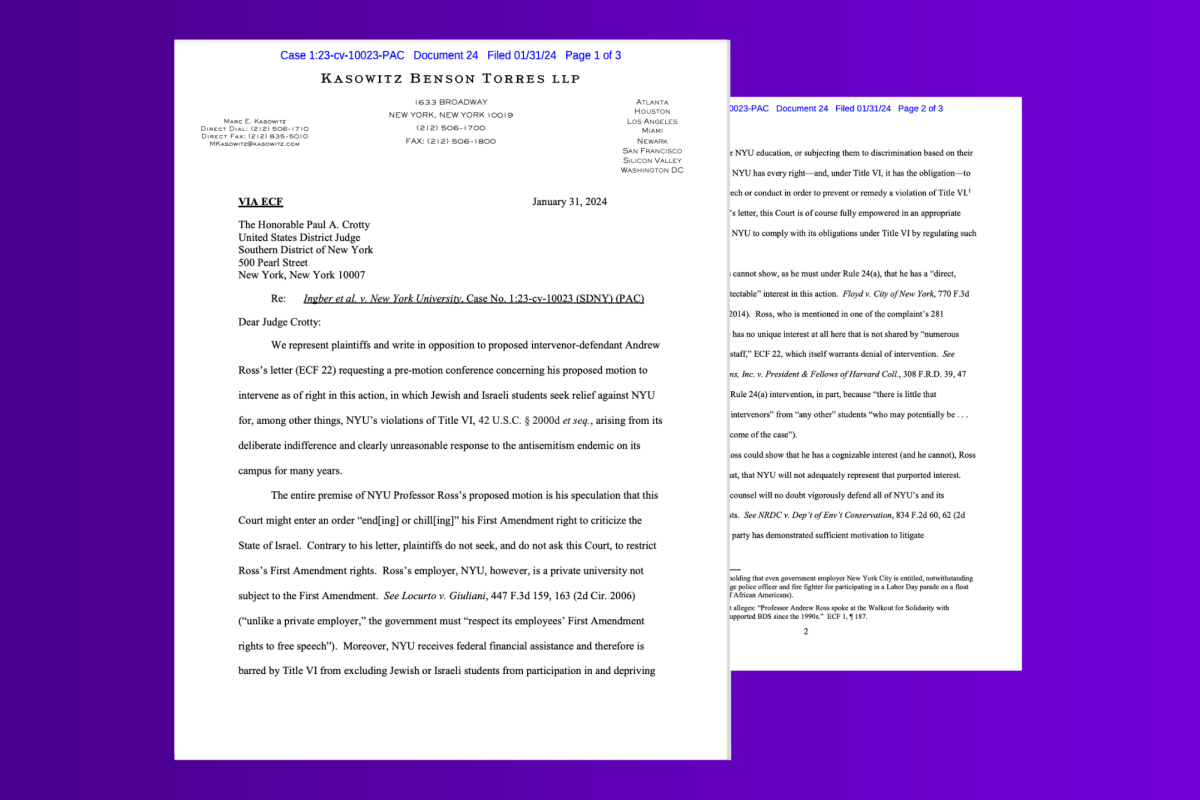CAS professor Andrew Ross, who was accused of “egregious acts of antisemitism” in a November complaint filed against NYU by three Jewish students, will be allowed to make a case for entering the lawsuit as a third-party defendant during a court conference. Ross is arguing that what plaintiffs are asking for in the lawsuit, which his legal representation claimed is an overly-broad definition of antisemitism, could cause his personal and academic freedoms to be “gravely harmed.”
The conference, which was scheduled to take place on Feb. 13, was canceled due to inclement weather and has not yet been rescheduled with a new date, according to Ross’ attorneys. The lawsuit, which is against NYU but names Ross, accuses him of being antisemitic for speaking at the Walkout for Solidarity with Palestine, establishing NYU’s chapter of Faculty for Justice in Palestine and endorsing “BDS since the 1990s.” The university and the plaintiffs in the lawsuit have both asked for Ross’ request to be denied.
“NYU has asked the court to deny the request to intervene in the case for two reasons: first, because we believe the entire case should be dismissed,” NYU spokesperson John Beckman wrote in a statement to WSN. “And second, because Professor Ross’ request does not meet the legal standard for intervention.”
Civil litigator Jonathan Wallace, a co-founder of the nonprofit The Parachute Project who is representing Ross, wrote that the professor “is not an anti-Semite but has with deep conviction spoken and written his criticism of the actions of the nation-state Israel” in a letter addressed to the United States District Judge of the Southern District of New York.
In the November lawsuit, which now includes four Jewish students and the group Students Against Antisemitism, plaintiffs accused the university of indifference to on-campus antisemitism, especially since the start of the Israel-Hamas war. The complaint also accuses NYU of violating federal civil rights laws and failing to apply its adopted definition of antisemitism — the definition used by the International Holocaust Remembrance Alliance — which includes “the targeting of the state of Israel, conceived as a Jewish collectivity.”
Plaintiffs are asking for NYU to take disciplinary action against students and employees “responsible for antisemitic discrimination and abuse,” as well as for the university to decline and return any donations “implicitly or explicitly conditioned on the hiring or promotion of professors who espouse antisemitism or the inclusion of antisemitic coursework.”
Mark Ressler, an attorney representing the plaintiffs and a partner at Kasowitz Benson Torres, told WSN he thinks Ross’ motion to enter the lawsuit as a defendant is “meritless” and referred to a Jan. 31 letter to the court calling for the professor’s request for a conference to be denied. Kasowitz Benson Torres filed an amended complaint against NYU earlier this month, alleging new violations of Title VI and the Civil Rights Act of 1964.
Ross is claiming the lawsuit aims to “chill” his First Amendment rights, but the plaintiffs’ letter argues that since NYU is a private institution — meaning it is not required to adhere to the First Amendment and can “regulate its employees’ speech or conduct” to prevent Title VI violations — Ross’ interest is not “legally protectable.”
Shahily Negrón, an attorney representing Ross who is also a co-founder of The Parachute Project, argued that the professor has a “legally enforceable interest” in entering in the lawsuit as a defendant because he is a professor at NYU, is directly mentioned in the complaint and has significant ties at the university.
“We are representing a number of people who are being accused of practicing antisemitism and it’s absolutely not that. People speaking anything about the victims in Gaza, people who have been harmed are being labeled as being antisemites and that’s not the case here,” Negrón said in an interview with WSN. “We are here to just try to remind people that First Amendment protected speech is really important, and our client should not be targeted or punished for exercising that.”
Last week, the Foundation for Individual Rights and Expression, a free speech watchdog organization, sent a letter to NYU’s administration regarding the suspension of Gallatin professor Amin Husain, citing a university policy that protects faculty from disciplinary action when they “speak or write as citizens.” The letter, written by FIRE program officer Graham Piro, demanded that NYU reinstate Husain and “refrain from punishing faculty for their protected expression.” The Parachute Project is also representing Husain.
FIRE has argued that the IHRA definition of antisemitism is “vague and overbroad,” and would “implicate a lot of protected, political expression,” according to Piro.
“On one hand, colleges and universities have a responsibility and obligation to create environments on campus where students feel secure — we don’t want students of a specific identity feeling like they are physically unsafe on campus,” Piro said in an interview with WSN. “Therefore striking this line between what is unprotected, things like discriminatory harassment, and also allowing for a wide swath of free speech is really a delicate balance to strike.”
Update, Feb. 16: This article has been updated with a statement from an NYU spokesperson.
Contact Adrianna Nehme at [email protected].






















































































































































